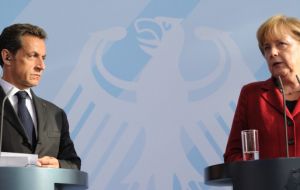MercoPress. South Atlantic News Agency
Paris-Berlin soften rescue terms admit “selective default” and announce Euro IMF
 Sarkozy-Merkel agree on new rules for the European Financial Stability Facility
Sarkozy-Merkel agree on new rules for the European Financial Stability Facility Euro zone leaders agreed at an emergency summit on Thursday to give their financial rescue fund sweeping new powers to help Greece overcome its debt crisis and prevent market instability from spreading through the region.
French President Nicolas Sarkozy said leaders of the 17-nation currency area had agreed to ease lending terms to Greece, Ireland and Portugal, while private investors would voluntarily swap their Greek bonds for longer maturities at lower interest rates to help Athens.
Acknowledging that the rescue package might lead credit rating agencies to declare Greek debt in limited default -- the first such event in the Euro 12-year history -- Sarkozy said Euro zone nations stood ready to protect Greek banks from the fallout, by providing credit guarantees if needed to ensure the banks can still obtain liquidity from the European Central Bank.
“We have agreed to create the beginnings of a European Monetary Fund,” Sarkozy told a news conference after eight hours of talks on widening the remit of the rescue fund, the European Financial Stability Facility.
European Council President Herman van Rompuy, who chaired the fifth summit on the crisis since February, said the leaders agreed the EFSF would be allowed to buy bonds in the secondary market if the ECB deemed that necessary to fight the crisis.
The EFSF would also be allowed for the first time to give states precautionary credit lines before they were shut out of credit markets, and lend governments money to recapitalise banks -- both moves which Germany blocked earlier this year.
The expanded role of the EFSF is designed to prevent bigger Euro zone states such as Spain and Italy from being shut out of the markets in the event of a Greek default.
Earlier, the ECB signalled in a policy reversal that it was willing to let Greece default temporarily as part of the plan, which involves longer and cheaper emergency loans to the Euro zone's three bailout states, a debt swap and a bond buyback. A proposal to raise money for Greece by imposing a new tax on banks was rejected.
The summit accord was based on a common position crafted by German Chancellor Angela Merkel and Sarkozy in late night talks in Berlin on Wednesday with ECB President Jean-Claude Trichet.
Dutch Finance Minister Jan Kees de Jager said a short-term “selective default” for Greece, long vehemently opposed by the ECB, was now a possibility.
“The demand to prevent a selective default has been removed,” he told the Dutch parliament.
Maturities on Euro zone rescue loans to all three bailout countries will be extended to 15 years from 7.5 and the interest rate cut to around 3.5% from 4.5-5.8% now.
The EFSF wider powers could help minimise any market contagion in case of a temporary Greek default, but analysts said it remained to be seen whether the relatively modest debt relief achieved by the package would be sufficient.
Sarkozy said the private sector involvement would reduce Greece's debt by 12 percentage points of GDP. But since the debt mountain already stands at about 150% of GDP, the relief hardly looks like a game-changer.
In an apparent trade-off for Merkel's new willingness to embrace new powers for the EFSF, Sarkozy agreed that private sector bondholders should take a hit and dropped a French call for a tax on banks to help fund a second Greek bailout.
The leaders also promised a “Marshall Plan” of European public investment to help revive the Greek economy, in a deep recession due to draconian austerity imposed by the European Union and the International Monetary Fund.




Top Comments
Disclaimer & comment rules-

-

-

Read all commentsthis was alway only short term,
Jul 22nd, 2011 - 01:08 pm 0untill they find a patsy,
camaron has the chance to withdraw, but as he is more interested in his friends, insted of his own country,
then he has no body else to blame, if the patsy turns out to be him,[has he ] .
The euro is fooked.
Jul 22nd, 2011 - 08:38 pm 0for no country is that rich, that it can contuenly bail out country after country,
Jul 22nd, 2011 - 09:06 pm 0sooner or later, the crash will come,
Commenting for this story is now closed.
If you have a Facebook account, become a fan and comment on our Facebook Page!